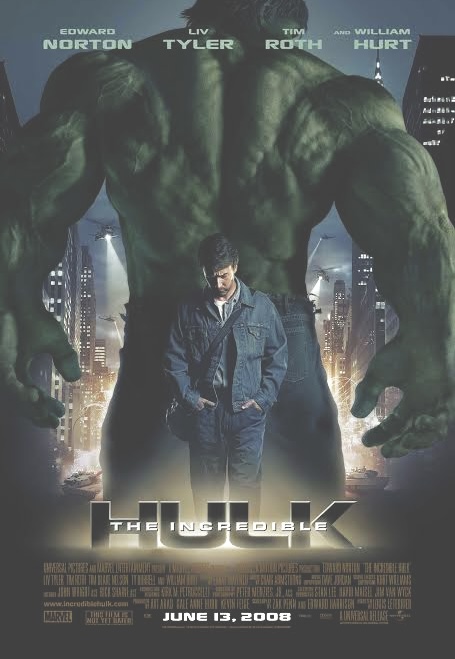The Incredible Hulk (2008) is often overshadowed in the MCU, but does it deserve more recognition? Here’s a detailed review of its action, story, and Edward Norton’s take on Bruce Banner.

The Incredible Hulk (2008) – Movie Review | Marvel’s Forgotten Origin Story Deserves a Second Look
Movie Title: The Incredible Hulk
Language: English
Genre: Superhero / Action / Sci-Fi
Director: Louis Leterrier
Cast: Edward Norton, Liv Tyler, Tim Roth, William Hurt, Tim Blake Nelson
Release Date: June 13, 2008
Runtime: 112 minutes
Production: Marvel Studios
Distributed by: Universal Pictures
Best Movie Review (BMR) Rating: 7.5/10
Introduction
Released just weeks after Iron Man in 2008, The Incredible Hulk was the second entry in the newly-formed Marvel Cinematic Universe (MCU). Despite its MCU connection, this film is often overlooked or forgotten by casual fans. With Edward Norton taking on the role of Bruce Banner, the film aimed to reboot the Hulk after the lukewarm reception of Ang Lee’s 2003 version.
While it doesn’t quite reach the emotional or storytelling heights of later Marvel movies, The Incredible Hulk is a solid, action-packed superhero film that offers a darker, more introspective take on one of Marvel’s most iconic characters.
Plot Summary
The story opens with Bruce Banner (Edward Norton) living in self-imposed exile in Brazil, working in a bottling plant and seeking a cure for the gamma radiation that transforms him into the Hulk. Haunted by the damage he caused and hunted by the U.S. government, Banner keeps a low profile while communicating secretly with a mysterious scientist named “Mr. Blue,” who promises to help him reverse the effects of his transformation.
When an accident exposes his location, General Thaddeus “Thunderbolt” Ross (William Hurt) sends a strike team led by Emil Blonsky (Tim Roth) to capture him. But when Banner is provoked, the Hulk emerges, and chaos ensues. Blonsky becomes obsessed with gaining power and eventually volunteers for an experimental serum, becoming the monstrous Abomination.
As Bruce reunites with his former love Betty Ross (Liv Tyler), he must face the monster inside him and make a choice: run forever or embrace his alter ego to stop an even greater threat.
Performances
Edward Norton delivers a thoughtful and restrained performance as Bruce Banner. He portrays the internal conflict and isolation of the character with depth, making Banner feel like a tragic figure rather than just a superhero. While Norton didn’t continue in the role (later replaced by Mark Ruffalo), his performance adds a cerebral layer to the character.
Liv Tyler plays Betty Ross with quiet strength and emotional warmth, serving as Bruce’s anchor and humanity. Her chemistry with Norton is gentle and sincere, though the film doesn’t explore their relationship in great depth.
Tim Roth is intense and menacing as Emil Blonsky. His descent into madness and transformation into the Abomination is one of the MCU’s earliest examples of a villain whose ambition mirrors the hero’s journey—but twisted. Roth’s commitment to the role adds physicality and menace.
William Hurt, as General Ross, brings gravitas and a sense of military obsession to his character. He plays a perfect foil to Banner, driven more by power than protection.
Direction and Screenplay
Director Louis Leterrier keeps the film grounded in reality, favoring a gritty tone that contrasts with the sleek, humorous vibe of Iron Man. The screenplay, co-written by Zak Penn and Edward Norton (uncredited), focuses on Bruce Banner’s emotional and physical struggles, crafting a fugitive-style story reminiscent of classic monster films and TV shows.
The pace is brisk, with chase scenes and action set pieces spread evenly. However, some character development and transitions feel rushed, likely due to reported behind-the-scenes conflicts and edits.
Visuals and Music
The visual effects were cutting-edge for 2008, especially in the transformation scenes and large-scale battles. The Hulk design is more monstrous and muscular compared to later MCU versions, giving the creature a raw, animalistic feel. The final fight between Hulk and Abomination in Harlem is brutal and satisfying, though a bit heavy on CGI.
Craig Armstrong’s musical score is moody and atmospheric, emphasizing the darker tone of the film. It lacks a memorable theme but supports the film’s tension and emotion effectively.
Themes and Symbolism
At its core, The Incredible Hulk is a story about control, identity, and redemption. Bruce Banner’s journey is about mastering the beast within—a metaphor for inner rage, trauma, and personal demons. The film also touches on military overreach, the consequences of unchecked science, and the burden of being different.
The Hulk becomes a reluctant hero, embodying the idea that sometimes strength comes from embracing one’s flaws rather than running from them.
Positives
- Edward Norton’s nuanced performance
- Intense action scenes and solid CGI (for the time)
- Darker, more serious tone that stands out in the MCU
- Memorable final battle with Abomination
- Strong thematic focus on identity and redemption
Negatives
- Lacks the humor and charm of other MCU films
- Some plot threads feel underdeveloped
- Supporting characters aren’t fully fleshed out
- Underutilized romance subplot
- Doesn’t fully connect to the broader MCU (at the time)
Final Verdict
The Incredible Hulk (2008) may not be Marvel’s flashiest entry, but it delivers a grounded and emotionally resonant origin story. With strong performances and a darker tone, it stands as an underrated gem in the MCU’s early phase. While it lacks the polish and world-building of later films, it successfully redefined the Hulk for a new generation—and deserves more appreciation than it often receives.
Best Movie Review (BMR) Rating: 7.5/10